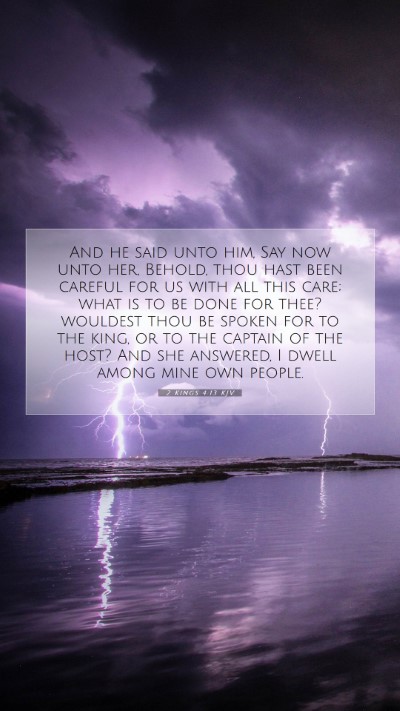Understanding 2 Kings 4:13: A Bible Verse Commentary
The verse 2 Kings 4:13 offers profound insights into the nature of hospitality and the recognition of spiritual gifts. To attain a thorough bible verse understanding, we will delve into the meanings extracted from various public domain commentaries, including the perspectives of Matthew Henry, Albert Barnes, and Adam Clarke.
Verse Text
2 Kings 4:13 (KJV): "And he said unto him, Say now unto her, Behold, thou hast been careful for us with all this care; what is to be done for thee? Wouldst thou be spoken for to the king, or to the captain of the host? And she answered, I dwell among mine own people."
Summary of Biblical Context
This particular chapter highlights the prophetic ministry of Elisha and the remarkable relationship he builds with a Shunammite woman, noted for her hospitable nature. The text sheds light on the broader implications of her generosity and the subsequent rewards bestowed upon her.
Bible Verse Interpretations
- Matthew Henry's Commentary:
Henry emphasizes the significance of the Shunammite woman's kindness and her humble refusal of worldly compensation. He suggests that her preference to remain among her people reflects her contentment and wealth in community rather than material gain.
- Albert Barnes' Notes:
Barnes draws attention to Elisha's role as a prophet who acknowledges the woman's care. His offer to intercede with authorities symbolizes the importance of recognizing and rewarding acts of kindness, thereby providing both comfort and hope.
- Adam Clarke's Commentary:
Clarke elaborates on the spiritual dimensions, indicating that the woman's assertion about dwelling among her people highlights her alignment with her faith and covenants. Her actions exemplify the profound nature of altruism and community.
Key Themes and Insights
Through the analysis of this verse, several key themes emerge that enrich our bible study insights:
- Hospitality: The Shunammite woman's hospitality is commendable and serves as a model for how we can care for others.
- Recognition of Needs: Elisha’s inquiry about her needs signifies the importance of seeing beyond the surface of people's lives.
- Spiritual Contentment: The woman’s response indicates a sense of fulfillment in her community and familial ties over materialism.
Applying the Verse to Life
This verse can serve as a guide for modern believers in applying Bible verses to daily life. The importance of hospitality and recognizing the gifts of others is essential in fostering community and connection.
Additional Bible Cross References
- Hebrews 13:2: "Be not forgetful to entertain strangers: for thereby some have entertained angels unawares." This verse reinforces the essence of hospitality.
- 2 Kings 4:9: "And she said unto her husband, Behold now, I perceive that this is an holy man of God, which passeth by us continually." Recognizing the divine in every act of goodness is also pivotal.
- James 2:15-16: "If a brother or sister be naked, and destitute of daily food, and one of you say unto them, Depart in peace, be ye warmed and filled; notwithstanding ye give them not those things which are needful to the body; what doth it profit?" This passage speaks to the practical necessity of responding to others’ needs.
Conclusion
In conclusion, 2 Kings 4:13 serves as a rich source for bible verse meanings and interpretations. Through the teachings of renowned commentators such as Matthew Henry, Albert Barnes, and Adam Clarke, we glean a deeper understanding of the spiritual and practical implications of hospitality, community, and recognition of the needs of others. This verse challenges us to reflect on our acts of kindness and the way we interact with those around us, encouraging a life that embodies the love and generosity demonstrated by the Shunammite woman.


